A lot of people have stories that are similar, and other people, like my friend's girlfriend, only tried for one school once and landed a funded position. So sweet for her, and sucky for the rest of us.
My own personal story started in 2008, when I decided I was going to try for an MFA in the first place. In late 2010, I applied for real. I applied to Brown (ha, no), Cornell (wait, what?), Michigan (yeah right), and IWW (death knells). As you can possibly imagine, I was not old enough, experienced enough, good enough, nor ready enough to go to any of these programs. I turned in a personal statement talking about how the MFA was a glass box upon a shelf full of my dreams and aspirations, and I was scared to take it down off the shelf and get my fingerprints on it or some other random nonsense like that. I also spelled Sherman Alexie's name wrong.
The second year, I got into a program. But there was no funding, and instead there was a fat benign tumor in my guts, which meant I needed to put the MFA (and a lot of my writing projects) on the back-burner for one more year so I could make sure I was well enough to move away and do my thing.
This brings us to the third year.
And even while I count the days until that beautiful plane with the one connecting flight in O'Hare takes me to Stonecoast, I sit with six rejections and two waitlists in my pocket to the other eight schools I applied to. I just lucked out that the one school I wanted was the one school who wanted me.
In short terms: it's hard out there for a pimp.
I freaked myself out so hard, guys. An entire year of my life was dedicated to this freakish awful circus called MFA Applications. And I, too, scoured the internet to figure out what the hell I should be doing.
Now that I am through the tunnel of doom and on the other side, I unfortunately still don't know everything. I know a lot of people got way more acceptances than I did. I know a lot of people know how to spell Sherman Alexie's name right the first time. But I also know I survived, and I'm wiser for it.
Here's the Top 10 Things I Wish I'd Known.
10: MFA DRAFT
9. JUNE WASN'T EARLY ENOUGH.
I should have started in March. There's so much to do, especially on the writing sample and even just really researching what schools would be a good fit for you, that you cannot wait until June. You just can't.
8. IOWA MAY BE FANCY, BUT IT MIGHT NOT BE A FIT.
The thing is, I took a chance. I wanted a school to pick me for who I was, not for who they thought I was. And this is who I am, guys. But instead of wasting my time and money and paper and postage on schools like NCSU and Brown, I should have probably focused more on smaller schools with good funding who would take on a crackerjack like me.
Stonecoast, thank God, was looking for crackerjacks. They collect crackerjacks. And now I get to crackerjack for two years with people who can actually help me.
And imagine if you got into one of those programs where you couldn't actually be yourself. I was (surprisingly) waitlisted at a school that was research heavy. I hate research. Why the hell would I apply to someplace that would expect me to research things?! I don't know, but I did.
I also looked at Poets & Writers for the answers. Obviously if a school is ranked 60 out of 150, it's easier to get into than IWW or Brown, right?
Ha, by like four percent, maybe! You're still sitting at 4 out of 900 applicants! Good luck to you, ma'am!
This is in no way saying that P&W isn't legit; it totally is and you need to read it and ear-mark it and kiss it before bed. But you also need to do some of your own research on the programs. You need to see if low-res is going to work out for you a little better than full-res, or maybe Amherst would be your worst nightmare instead of your dream come true, because you have nothing in common with the faculty. Or maybe there is a really sweet program in Kalamazoo (there isn't any program in Kalamazoo, please don't get your hopes up) that gives full funding but it's up-and-coming, and no one knows about it yet.
That happened to me with Wichita.
Cut to: 2008. Interior. Book Fair at AWP. I see Wichita's table. It's small. I go over there. They are really nice and sweet and they tell me all about new stuff that is happening. I decide Wichita is not for me.
Cut to: 2014. I'm near the end of my application process, and I decide in a panic to apply to Wichita. It's been a few years. They've grown. Seth Abramson mentioned them and now everyone wants WSU.
Guess who didn't get in.
Find the place that fits you, not the place you need to fit.
I wasted so much time and money. And in the end, Stonecoast didn't even need my damn GRE.
7. F THE GRE.
But it's not important as it will seem.
I feel like a lot of us glomp onto the GRE because it's the only assessment-based score we get during our progress in this dark hole of applying. But really, seriously, if you figure out what programs you really want to apply to, and none of them want the GRE, then you may not want to take the GRE. Of course, other people will disagree with me, saying that you may find a program you like down the road and you're going to need that score. It's a gamble, but either way, GRE or no GRE, don't use your entire summer studying for it instead of workshopping your writing sample.
Like me.
I worked so hard on that GRE, and I got a pretty good score. By pretty good, it was high enough to get into any school I wanted ... if this was the ACT and I was going for undergrad. But I wasn't, and the GRE really meant nothing because they didn't like my writing sample. So hey, kids! Know your vocabulary, but go to the writing sample. Use your summer for the writing sample.
Writing sample.
Also, know which programs you want to send your GRE to, before you leave for the testing. They give you four free schools, and use that. It's an extra hundred dollars.
6. IT IS SERIOUSLY ALL ABOUT THE WRITING SAMPLE. NO. SERIOUSLY.
Don't do novel excerpts. Don't show off something that you just wrote. And don't ever turn anything that wasn't workshopped. Workshop it. Send it out. Tear it apart, or the applicant committee will.
5. PUT YOUR HEART INTO IT, AND THEN FORGET ABOUT IT.
But then there's this weird drop-off come February, when there is nothing to do and no one is telling you how you did.
Around mid-March, I should have been having the time of my life, since my bridesmaids and I went on vacation to check out my wedding venue and I had a week off from school. However, I was fervently watching MFA Draft 14 to see if I had gotten into Boulder or Wichita. I checked the mail every day, I pestered my parents to see maybe my mail had magically ended up in their mailbox ten miles away.
You just have to forget about it. From January 3 to April 15, you will know nothing, Jon Snow. You have to carry on with your life. Your beautiful, fulfilling, day-job life.
4. DON'T USE THE MFA AS AN ESCAPE HATCH.
I actually got into an argument on MFA Draft about how some people are using the MFA to run away from a life they don't want. I think that every writer has a small little part of their brain that says, "Man, if I could just write all day for a living and do nothing else, then I would have it made." Well, I know writers who write for a living, all day, and it's not as easy as you'd think. Just assume that anything you do, anywhere you go, anyone you love will have their setbacks. That weird, tired, frustration that comes with being alive and breathing on Earth does not go away just because you have moved away, changed jobs, gotten married, or even entered an MFA program.
I said that in fact I'd known people who were using the MFA application as a possible "escape hatch" from their crappy lives and their crappy situations. Having someone pay you a stipend to sit in a dorm and type, type, type? Greatest thing ever, right?
No. And I was a little vindicated when a few days later, another Drafter posted that she was frustrated and sad because not getting into a program this year meant having to go back to her crappy job where no one treated her with any respect. Someone commented with words of wisdom, asking, "Will you then be okay working that crappy job and getting disrespected while you're in graduate school?" Because guess what, kiddos, you're still going to have to work to put yourself through school (and yes, that includes full funding).
"But Dawson!" you exclaim. "I got into Brown and I have enough savings!"
Sweet. But then you run into other problems. Like absolutely no job prospects when you graduate (helloooo adjuncts!). Or you're living in Providence, which is a gigantic college town with swindly landlords who will shut your heat off in the middle of the night. Everything looks shiny and beautiful, until you get there and start to see the grease marks right up close.
And I was in a writing cohort in my undergrad. I will be the first to tell you that getting a writing degree is not easy. Is it fun? If you love it, and I loved it, it will all be totally worth it. But I still had to contend with deadlines, a ridiculous amount of writing, and everything I wrote got torn apart to shreds. I had to deal with everyone else and the competition of having four people going for one final little slot of production at the end of the four years, and everyone was good. And even when people weren't good, you wondered why they got praise that day and you didn't. I had a professor who absolutely hated my writing style, and I thought that meant that I sucked forever.
It's not easy. Writing is never easy. But we do it because we love it.
This also plays into this Michael Chabon idea that if you go into an MFA program, you will immediately become someone. You won't. You'll probably end up flitting around from adjunct job to adjunct job, trying to make ends meet.
In summation: You go into an MFA program to get better at writing. You don't go into an MFA program to hide from the world or jump-start your life out of your parents' basement. Otherwise, you're going to be even more frustrated and depressed than you were when you were applying in the first place.
3: SCHOLARSHIPS! FAFSA! MONEY! YAY!
There is the department.
And then there is the graduate school as a general whole.
Two chances. Two sets of opportunities. Don't forget that second one.
Oh, and even if you are paying completely out of pocket, you should do the FAFSA. Some schools consider it a requirement.
Also. Another big thing to remember about money. Applications cost. A LOT.
2: KNOW YOUR FACULTY. KNOW YOUR RECOMMENDERS.
And now that person is one of my recommenders. Oh look! A transition!
It's important to trust your recs. It is important to know these people believe in you and are going to fight for you. One of my recommenders the first time around was a very fancy person, but they wrote the absolute worst recommendation I've ever seen (because yes, they gave me a copy). They meant no malice by it; they were just an awful letter writer. It was literally a paragraph, and not a big fat paragraph. It was like a tiny little "I endorse this message" disclaimer more than it was a meaningful explanation of their adoration for my work. Or you know ... whatever.
You also need to treat your recommenders like real people, because they are real people. On the flip side of life, I work as a recommender for other people. I absolutely hate it when people hand me a form or an address or information and they're like, "Yeah it's due tomorrow." I tell people I want at least two weeks' notice, and I think that's being pretty nice to them. On the other hand, I also get pissed when people hand me information and they're like, "Oh yeah, and it's due in I don't know ... April?" And it's October. I will forget. Don't think just because you dropped it off and touched base (in a very literal way ... like reaching out and touching a base and then running away with immunity to taggers), that I am even going to remotely remember that you need a recommendation come April. I've had relationships shorter than the time you are asking me to remember something. So no, that don't cut it.
Also, get them a present. They'll really appreciate it, and then they'll do more recs for you.
Also, ask for more than what you need. I've heard so many horror stories about people who didn't get into a school because some a-wad didn't turn in their rec letter. How dumb is that? You do everything right. You pay money. And you don't get in because your recommender didn't turn a piece of paper in?!
But it happens.
So if you need three, get four. Or five. I had five people on deck for three slots, and all of my recs got turned in on time.
Also, you need to send them SASE's for their rec letters and you need to write out all of the information for them. It needs to be organized and categorized so they know exactly what is going on with life. If not, they'll shut down or just get really angry that you didn't make this easy. And do you want an angry person writing your rec letter?
No. The answer is no.
Last thing: if you can, meet the faculty. One of my biggest regrets was not being able to make it to AWP this year. I've got every year since 2008 when I discovered AWP existed as a wee sophomore in college. You need to go to those booths, make actual connections with people, and really honestly have that human experience with other humans. Talk to students, get to know the school. Once at AWP, I went up to the booth of one of my top picks, and this little girl with a fancy t-shirt informed me and a group of kids, "Oh. If you write genre, don't even think about applying here. Or at least try to mask it in your writing sample."
That was a big fat nope from me. And I saved 70 bucks on my application, and the faculty saved their eyesight not having to read it.
Also, take advantage of AWP. I actually had someone come up from NEOMFA and woo me to their program and took my name and got really excited about me going there. NEOMFA wasn't for me, because at the time, I did not have a driver's license. But it was really sweet to be wooed. Wouldn't all of us love to be wooed during this process?
1. LOVE YOURSELF, NO MATTER WHAT.
Well, you are good enough. We all are. Because we are wanting to dedicate two years of our lives to getting better at something. How many people in the world do that? Who gets up in the morning and thinks, "I want to go and get better at this thing that is not going to make me any money and will probably cause me to spend a lot of time by myself, miserable and self-loathing." Furthermore, how many people say, "There is this thing I love to do, but I am humble enough to know that I could get better?" If you think a lot of people say these things, then I commend you, because you have kept good company.
But I've met a lot of people who just sort of slug through life, or they have such an ego, they never try to get better. So many people out there would rather say, "Oh, well, I'm sure it'll happen on its own." or "I always wanted to do this thing, but you know, stuff." People suck because they procrastinate. People always talk about what they could have been or what they're going to be, but they never do anything to better their situation.
The fault, dear Brutus, is not in our stars.
So the fact that you are even reading this blog, looking at schools, applying to programs, and going off into the great perhaps ... all of that tells me that you are worth something, and you want your writing to be worth something.
Be kind to yourself. Allow yourself to be open to growth and criticism. But never allow anyone to make you feel like you're a nothing. And if you don't get into a program, it does not mean that you suck. It means that your writing sample sucked. Or maybe your writing sample just didn't fit whatever that school wanted. Or maybe you just aren't ready for the great perhaps, but perhaps next year you will be.
The only thing you can do is keep loving yourself, keep writing, and keep fighting.
Good luck. And God Bless.
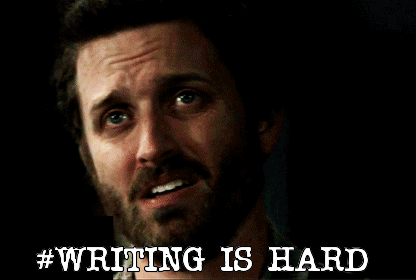
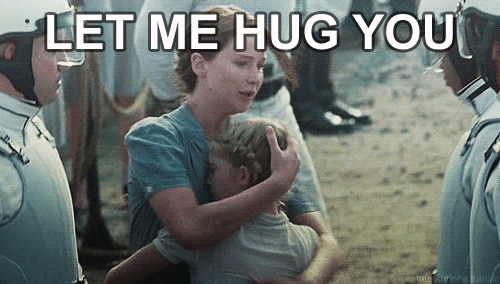


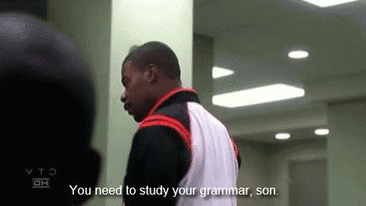

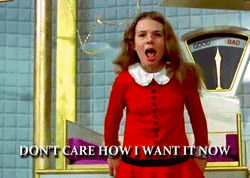
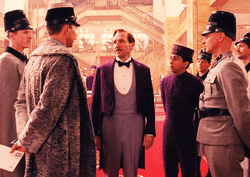
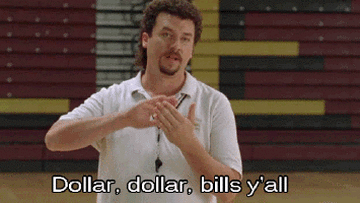


 RSS Feed
RSS Feed